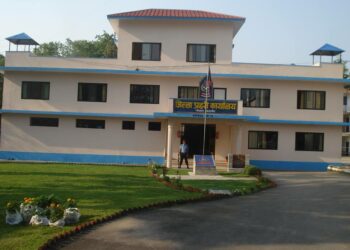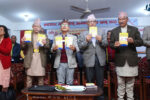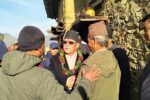In his Arizona address in late June this year, the US National Security Advisor Robert C. O’Brien reiterated the Trump administration’s hardened stance on China and accused the Asian giant of her disregard for human rights and freedom of expression.
He also alleged that the US-China relationship had been lopsided whose terms were dictated by China and the Chinese Communist Party and that it required a serious reconsideration and revision as initiated by President Trump.
His speech was full of accusations, including Chinese Tech Companies and nationals spying on and illegally selling the US data.
While these accusations and their relevance in Nepal require a separate article with an in-depth investigation into the matter, this article discusses the CCP’s ideological standpoint and assesses the party’s interaction with the ruling Nepal Communist Party (NCP).
It makes one wonder CCP’s influence on the NCP, the kind of training the NCP has been receiving from the Chinese communists, and their implication on Nepal’s overall system of governance and democracy.
While O’Brien’s statements and accusations maybe Trump’s calculated move to serve his political ambitions at home, the National Security Advisor’s assessment of the CCP as a communist Organization stands true.
Like Lenin, Stalin, and Mao practiced and interpreted, communism is true ‘a totalitarian ideology.’ Communism seeks to achieve its end goal of a collective nation-state, for which individuals are merely a means to achieve that goal.
“Individuals do not have inherent value under Marxism-Leninism. They exist to serve the state; the state does not exist to serve them.”
This remark from O’Brien offers a window into the NCP government in Nepal and PM Oli’s apparent ambition to consolidate his regime by having total control over the people’s lives.
The ruling Nepal Communist Party was a rather unusual unification of the erstwhile NCP–Unified Marxist Leninist (NCP–UML) and NCP–Maoist Centre (NCP–MC).
While it began with an electoral alliance between the two communist forces, the senior leaders from both the parties realized their political necessity of a unification.
Many political analysts saw this unification as “a marriage of convenience” rather than “a result of a conviction.”
The NCP’s fate in the following month exposed the cracks whose roots lied in backdoor negotiation among only a select few senior leaders from the two parties.
The lack of an extensive discussion about the party’s ideology and leadership management has caused a series of intra-party disputes since then, the most recent of which hinged on PM Oli’s resignation from both the party’s chair and the prime ministerial office.
The CCP’s involvement in all of these developments is noteworthy. In September of 2019, the NCP and CCP held a two-day symposium on Xi Jinping Thought, where around 200 communist leaders received “training” from Chinese communists.
During the same event, the two parties signed “a six-point bilateral agreement.” One of the points stated that the two parties would not interfere with the other party’s internal matters.
However, China’s moves in the following months showed the inevitable lopsidedness of this agreement. China could and did interfere in Nepal Communist Party’s internal affairs.
These exercises from the CCP and China’s high-level officials, and NCP leaders’ convenient submission under China’s evident interference, only put a question mark at the supposed agreement the two communist parties signed in September 2019.
When the NCP struggled with internal disputes, the Chinese Ambassador to Nepal, Hou Yanqi, met almost all senior NCP leaders, including the prime minister and the president of the country, in an effort to preserve the communist unity.
Despite uproars from different corners of the political and diplomatic circles, criticizing the ambassador’s move that violated diplomatic norms and conducts, Hou Yanqi repeated the same anti-protocol high-level meetings when the NCP dispute resurfaced.
In recent days, she has geared up her media game, increasing the frequency of her appearances in popular national media, where she appears defending not just her moves but that of China by using vague sugarcoated words.
The ruling NCP is not an exception to this culture. As discussed above, the NCP lacks ideological clarity, where the top-level leadership management has been the party’s major Faultline since its unification.
In addition, the communist parties of the two countries held a one-day virtual workshop on June 20, 2020, at a time when the NCP dispute was at a peak.
These exercises from the CCP and China’s high-level officials, and NCP leaders’ convenient submission under China’s evident interference, only put a question mark at the supposed agreement the two communist parties signed in September 2019.
It makes one wonder CCP’s influence on the NCP, the kind of training the NCP has been receiving from the Chinese communists, and their implication on Nepal’s overall system of governance and democracy.
Once the country’s democracy is destroyed by the heavy doses of CCP’s development policies, it will be difficult for Nepal to reclaim its position among democratic nations, including the U.S., Japan, India, the U.K., and so on.
However, Nepal’s political culture and history plant a seed of doubt and uncertainty in the head of anyone trying to anticipate the country’s politics.
The fact that almost all parties here operate without a strong ideological allegiance and rather on a personality-based politics, what happens next usually depends on what the front-line leaders succeed in negotiating, be it within the party or with the opposition.
The ruling NCP is not an exception to this culture. As discussed above, the NCP lacks ideological clarity, where the top-level leadership management has been the party’s major Faultline since its unification.
By introducing controversial bills and ordinances that limit public and media liberty or by unilaterally deciding the fate of his party, PM Oli has made his authoritarian tendencies evident.
An obvious trajectory for NCP’s future may not be detected with certainty, therefore. What sounds unlikely—including PM Oli splitting the NCP to reestablish NCP–UML and form a coalition government with Nepali Congress— becomes an obvious outcome then.
Against this backdrop, therefore, the CCP’s interference in NCP’s internal issues matters a great deal because it influences the party and, therefore, Nepal’s overall politics, which may be headed in a direction unfavorable for democracy and human rights.
NCP co-chair and prime minister Oli’s recent actions, within the party and as the country’s executive head, make CCP’s influence on the ruling NCP a matter of concern for defenders of democracy and human rights.
By introducing controversial bills and ordinances that limit public and media liberty or by unilaterally deciding the fate of his party, PM Oli has made his authoritarian tendencies evident.
His populist remarks and actions against Madhes, including the proposed naturalization law that disproportionately affects Madhesi and women, PM Oli has demonstrated the kind of nation-state he aspires to establish and the kind of nationalism he propagates.
In all of these, individual liberty takes a backseat, and in the name of national security, sovereignty, and territorial integrity, Oli and his party continue to exploit and discriminate against the poor and minorities.
If this is what the NCP and PM Oli have been learning from the workshops and “experience-sharing” seminars, the CCP poses a serious threat to the political system that our constitution ensures.
(Views expressed in this article are the author’s own and do not necessarily reflect Khabarhub’s editorial stance)









Comment